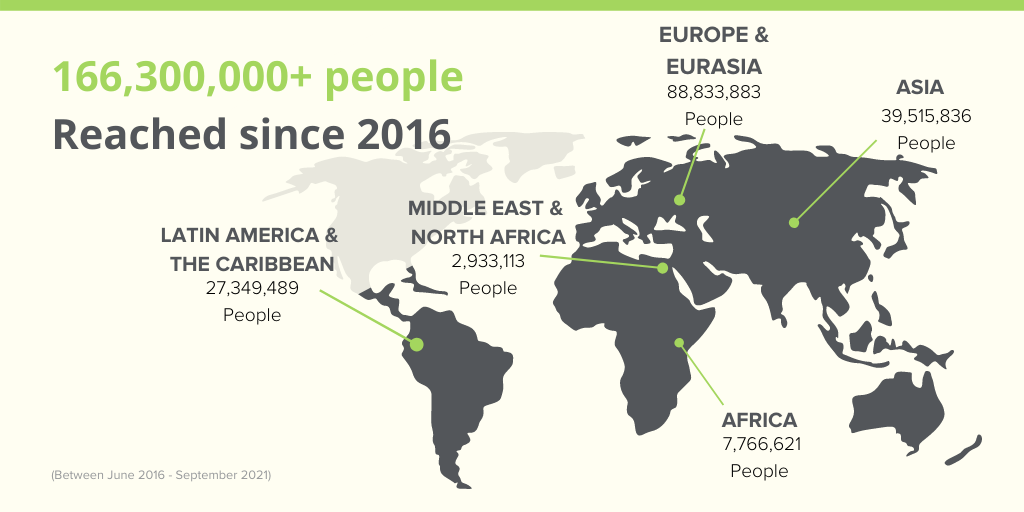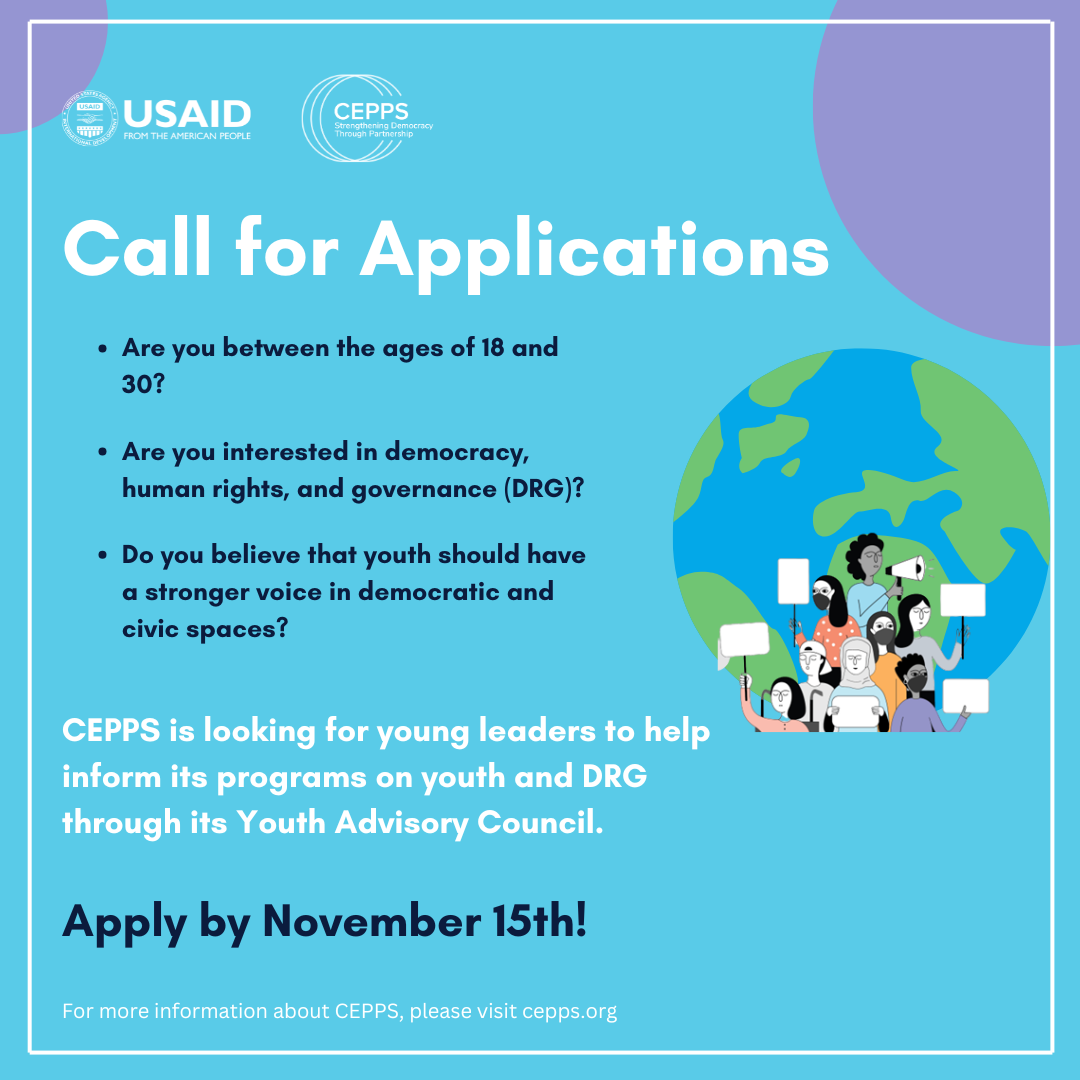To read this issue in its original format, click here.
Dear Colleagues,
Today, the Consortium for Elections and Political Process Strengthening (CEPPS) joins its partners around the world in observing International Day of Democracy. With governments and citizens still contending with the unprecedented health, economic, and social challenges brought on by the COVID-19 pandemic, the nature of this crisis is not only proving to be multidimensional but also long-term. This highlights the urgency of preserving democratic governance systems and institutions, while simultaneously enhancing their abilities to respond to longer-term challenges with durable solutions that address citizens’ collective needs and protects their individual rights and freedoms.
Despite these challenges that we continue to face together, we have also realized that it is possible to effectively strike this balance. Many solutions have been developed over the course of the pandemic which can help ensure that trusted processes like inclusive decision making, government accountability, and citizens’ oversight are safeguarded during future crises. For example, as CEPPS has observed through its collaboration with its global partners, it is possible for political parties to replace in-person rallies and traditional canvassing using technology-enabled virtual alternatives, especially when considerations are made for communities without reliable access to technology. Similarly, it is also possible to safely administer elections, but COVID-era adaptations must be socialized early to ensure that they are well understood and trusted by voters. Furthermore, governments can make emergency decisions that are transparent, inclusive, open to peaceful political debate, and accountable to citizen oversight. Therefore, as CEPPS reflects on its efforts to promote, uphold, and strengthen core democratic principles and processes this year, we look forward to working together to build on these lessons learned.
Please follow us on social media as we continue to highlight some of the important efforts our partners are making to advance democratic values and institutions worldwide.
Yours in Democracy,
Jerry Lavery
Technical Director, The Consortium for Elections and Political Process Strengthening
Democracy! The Podcast is brought to you by CEPPS with support from the United States Agency for International Development through the Global Elections and Political Transitions Award. Each episode takes an in-depth look at some of the biggest challenges facing the vitality of democracy around the world. Produced in partnership with the International Foundation for Electoral Systems, the International Republican Institute, and the National Democratic Institute, hear from some of the most experienced experts working in the field of democracy, human rights, and governance and learn from first-hand accounts as they share how they tackle real-life problems and help move countries towards a more democratic process for all. The first 5 episodes are now streaming.
Listen to the latest episode and subscribe wherever you get your podcasts.
This June, the Ghana Center for Democratic Development (CDD-Ghana) with support from CEPPS/NDI, convened a conference under the banner: “Strengthening Parliamentary Monitoring Organizations (PMOs) in West Africa to Enhance Parliamentary Openness, Inclusive Policies, Transparency and Responsiveness” for a network of West African PMOs in Ghana’s capital city, Accra. The conference served as a platform for a peer-to-peer exchange of experiences and lessons learned. Likewise, it provided an opportunity for the network to develop and formally adopt a shared learning agenda and system for sharing information moving forward.
PMOs can play an important role in preserving and advancing democratic development worldwide. However, like other watchdog groups, PMOs often struggle to develop effective relationships with the institutions and/or individuals (in this case parliaments, parliamentary committees, and individual members) that they seek to monitor, assess and help strengthen. Support of regional peer-to-peer exchanges within the PMO community allows the sharing of challenges, successes and lessons learned – a sentiment echoed by one conference participant when he observed that “most of the problems that haunt us as individual member states haunt us collectively.”
Watch the video from the conference now!
Election practitioners, donors and scholars are often hard-pressed to find comparative and trustworthy data on the costs associated with running an election. This information gap impedes effective budget planning by election management bodies, as well as opens the door for the evolution of corrupt practices within their institution’s financial management systems and procurement processes. Likewise, it impedes their ability to implement reforms and technological solutions aimed at increasing transparency, citizen oversight, and inclusion.
To address these and other issues, CEPPS/IFES has developed and is finalizing the Pricing in Elections (PiE) Database, which will be a free public portal that will allow users to search, filter and compare granular data on election costs worldwide. The tool will report on common costs incurred across the entirety of the election cycle including but not limited to costs associated with boundary delimitation, voter registration, results management and dispute resolution and offers new insights that support EMB planning as well as the oversight activities of political and civic watchdog institutions.
You can learn more about the PiE database methodology underpinning its data collection and categorization through this paper, which will also be available on the database and which was first presented at this summer’s Electoral Integrity Project Conference. Finally, if you’d like to receive updates on this tool before it goes live, please contact CEPPS/IFES Research Officer Chelsea Dreher.
CEPPS’s Youth Democracy and Governance Cross-Sectoral Initiative (DRG CSI) is a discussion and knowledge-sharing forum dedicated to helping practitioners, donors, and young leaders across development sectors explore opportunities and share promising practices to advance young people’s political participation, representation, power, and leadership in decision-making processes and positions. As part of this initiative, in March CEPPS announced the formation of the Youth Advisory Group (YAG), a six-month leadership opportunity for young people between the ages of 18 to 30 with a proven track record of leadership and participation across youth development sectors. Following a competitive application process, Asim Ghweiri (Jordan), Esma Gumberidze (Georgia), Santiago Rodriguez (Colombia), Sobita Gautam (Nepal), Mila Mladenova (Macedonia), Tinashe Mazala (Zambia), and Winnie Akidi Adile (Uganda) were selected as inaugural members of the group.
As YAG members, they are playing a key role in expanding the knowledge and resources for designing and implementing youth-led cross-sectoral programs to the development community. This month, these young leaders shared their thoughts on how the CEPPS Youth Advisory Group helps them gain decision-making power in their home countries.
Watch their videos now!
Under the GEPT mechanism, CEPPS has reached more than 166,300,000 people since 2016. This includes elected officials, government officials, political party representatives, civil society organizations and more!



